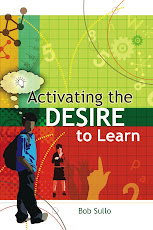Looking through
ASCD Smartbrief recently, I saw the headline “Exercise balls replace
students’ chairs in Ind. Classroom.” It looked interesting so I clicked the
link and was brought to “Fisher Kids Swap Chairs for Exercise Balls.”
The article discusses how a 4th grade teacher is
planning to replace student chairs with exercise balls, a decision based on
sound research: “A study at the Mayo Clinic supports chairless classrooms,
saying that exercise balls improve students' posture and muscle strength.
Students also can burn off excess energy. And their concentration may improve.”
Mayo Clinic. Well-respected. Impressive. Plus the teacher, Angelika Thompson,
did her own action research. After experimenting with exercise balls last year,
she reported that 70% of her students increased their core muscle strength.
“OK,” I thought to myself. “This is good. An innovative
teacher implementing strategies supported by research that will increase her
students’ strength while helping them concentrate.” I should have stopped
reading when things were going well, but fool that I am, I plowed ahead and got
to this line:
“But sitting on the exercise balls is a privilege. If
students make poor choices or don't behave in class, they must sit in a chair
the rest of the day.”
What??? Don’t exercise balls improved posture and muscle
strength and maybe help students concentrate? How in the world can this be a
“privilege”? Think about this for a minute. A kid makes a “poor choice” (Note:
Code for “does something the adult in charge doesn’t like.”) So how do we
handle it? By saying, “You don’t deserve the opportunity to improve your
posture and muscle strength. You have forfeited the right to improve your
concentration!”
This is today’s world of education, where “privileges” must
be earned and where we are infinitely more interested in exercising control
than in doing what research shows is best for kids. In that spirit, let me
offer a couple of additional strategies to ensure kids remember who is in
charge and remind them that “privileges” must be earned:
- Take
the case of a kid with a vision impairment. If they make a “poor choice,”
simply take away their glasses for the rest of the day. (Give them their
glasses tomorrow morning with a smile and friendly reminder that, “Today
is a new day. I hope you choose to make better choices.”) I know research
suggests glasses are helpful, but, really, they are a “privilege” and must
be earned, right?
- And
you know that kid who is easily distractible (and distracting)? The one
who we let wear headphones while listening to his iPod. It seems to help
him concentrate and he is certainly less bothersome to his classmates.
Well, if he makes a “poor choice,” take away the iPod and headphones for a
day. He may not learn as much and he may interfere with the learning of others,
but, hey, he has to learn that “privileges” are earned by compliance.
I just celebrated my birthday. I’m 61. I’ve been in
education for nearly 40 years. I don’t know how much more insanity I can
tolerate. I’m not overly religious, but I’m praying for strength as I continue
to fight the madness.
Final thought: I don’t mean to be critical of the teacher.
The whole “privilege” paragraph was written by the reporter. It’s possible she
included it as a “favor” to the teacher so readers of The Indianapolis Star would perceive the teacher positively, as a
no-nonsense adult who makes kids earn their “privileges” and not some
hippie-type liberal who brings innovative strategies into the classroom simply
because they are good for kids.
***
As always, if you enjoyed this and found it useful, please
send the link to your friends. Thanks.
Bob Sullo
PO Box 1336
Sandwich, MA 02563
For information about books by Bob Sullo and to schedule a
keynote, workshop, or series for your school, agency, or parent group visit
www.internalmotivation.net






I really enjoyed reading your views here Bob. I"m going to share them with my practicum group.
ReplyDeleteThanks.